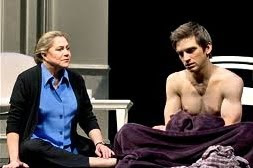Thursday, May 10, 2012
THEATRE REVIEW: HIGH
JOHN COULBOURN,
Special to TorSun
10 MAY 2012
R: 4/5
Pictured: Kathleen Turner, Evan Jonigkeit
In HIGH, playwright Matthew Lombardo trots out age-old notions of faith, hope and charity for a contemporary romp around the track — and while it all ends in a bit of three-horse pile-up, the play is still a compelling, at times, even engaging horse race. On the surface of things, HIGH, which opened a very limited run at the Royal Alexandra Theatre Wednesday, is a play about addiction, involving as it does, a prolonged effort to save one young man from the demons of drug abuse and the horrors that led him there. But on another — not necessarily deeper — level, it is also a play about the power of faith, the cost of hope and the human price of charity.
Set in a church-run centre for drug addiction, it is the story of the foul-mouthed Sister Jamie (played by Kathleen Turner) and her efforts to free young Cody Randall (Evan Jonigkeit) from the a world of drug abuse and prostitution — a world he’s inhabited since childhood, sharing it with demons with very real and familiar faces. Initially, Sister Jamie is a less-than-willing participant in the battle, dragooned into it as she is by Father Michael (Tim Altmeyer), her spiritual and temporal boss, who has, it develops, more than a passing interest in her success or failure of the young man’s treatment.
In creating HIGH, Lombardo has crafted an undeniable showcase for a mature actor of Turner’s range, and, under the direction of Rob Ruggiero, she makes the most of it, tearing into the role of the troubled nun-with-a-past with a vengeance and finding a deep reserve of humour in the process. Sister Jamie’s prickly personality and her humanity are both given flesh in Turner’s hands as she spits out dialogue in short, staccato sentences that, while highly effective, have little to do with writing and punctuation.
There’s quality work from Jonigkeit too, as he fearlessly inhabits the dark world of his character, filling it with a potent combination of knowingness and innocence that keeps his audience on-side despite his obvious bent for self-destruction. Under Ruggerio’s direction, even Altmeyer, lumbered as he is with a role that exists largely to advance the plot, succeeds in making his mark, adding intimations of darker shadings of humanity to the role of the good-natured-but-troubled priest at every turn.
But ultimately, despite a reported major reworking of the script since its less-than-successful Broadway run, HIGH remains far more interesting and compelling for the power of its performances than its plot. In the final analysis, while it purports to examine issues of faith and human charity, it fails to confront them, retreating too often into the comfortable inside argot of clerics and social workers instead of bringing things to the street level where most of us live.
And despite a deeply moving performance by Jonigkeit, his Cody fails to exhibit not only the physical ravages of his abusive and abused life — stripped down, he’s frankly more likely to be mistaken for a steroid abuser than a junkie — but the emotional ones as well. In a tough-love world where the battle is all too often centred on finding a soul in the human wreckage, he seems to have a surfeit of it, and in consequence, even though HIGH aims to be a play about saving fallen sinners, it emerges as a play about saving fallen saints instead.
Subscribe to:
Post Comments (Atom)




No comments:
Post a Comment